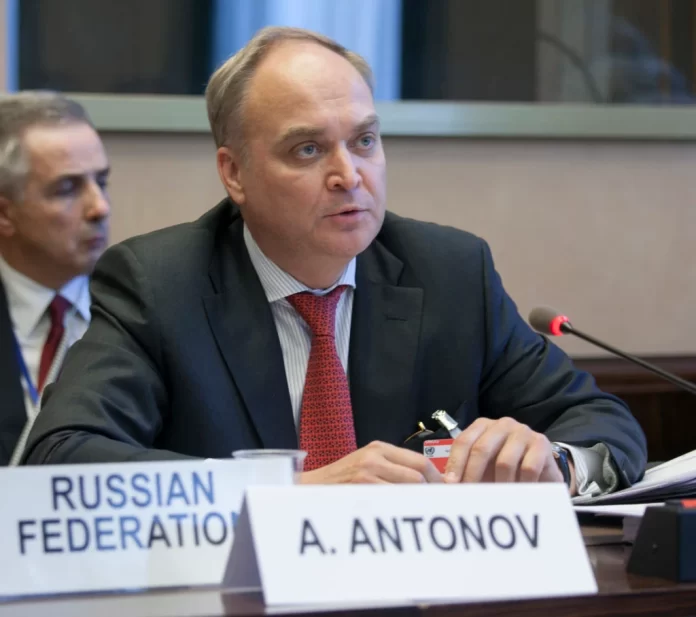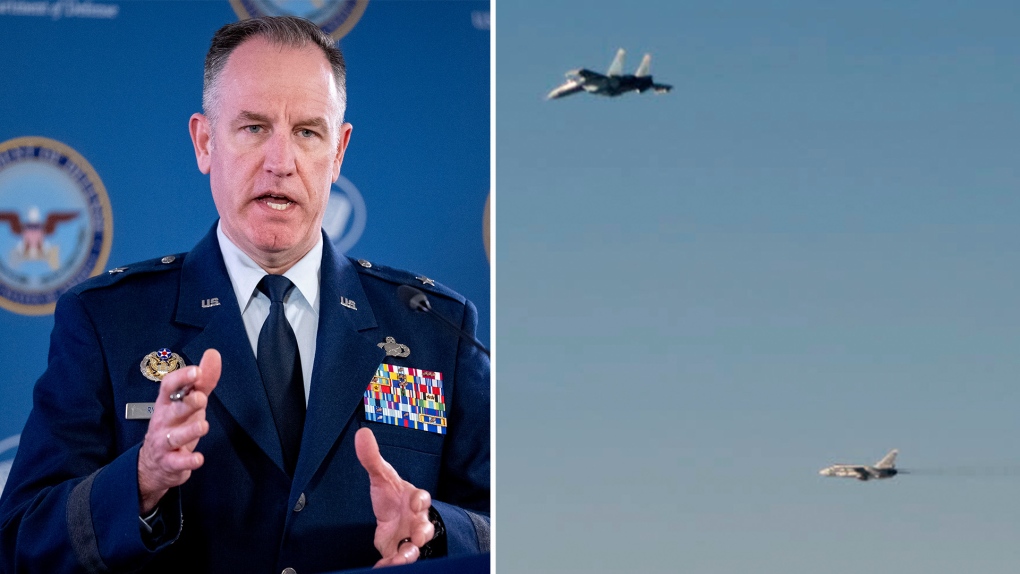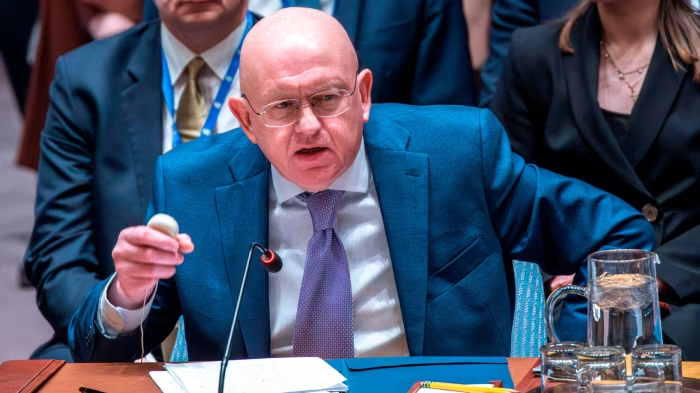Russian Ambassador to the United States Anatoly Antonov has told Newsweek that the U.S. unmanned aerial vehicle downed after an encounter with Russian fighter jets over the Black Sea was supporting Ukrainian forces in the course of the current conflict.
Asked by Newsweek about the incident in which the Pentagon accused the pilots of two Russian Su-27 aircraft of “unsafe and unprofessional,” even “reckless,” actions that forced its Air Force to deliberately bring down its MQ-9 Reaper spy drone and led the State Department to summon the Russian envoy, Antonov said he “categorically rejected all the insinuations of the U.S. side.”
“I explained the position of the Russian Federation,” Antonov said. “I stressed that the American UAV that was moving deliberately and provocatively towards the Russian territory with its transponders turned off violated the boundaries of the temporary airspace regime established for the special military operation, which was communicated to all concerned users of international airspace in accordance with international norms.”
“At the same time,” he added, “the Russian fighters scrambled to identify the intruder did not use on-board weapons or come into contact with the UAV.”
The account came in contrast to that of U.S. European Command, which shared a statement with Newsweek earlier Tuesday alleging that the Su-27s had dumped fuel on the MQ-9 and flew in front of it before one of the jets struck the drone’s propeller, ultimately causing it to crash.
Antonov argued it was the U.S. at fault and argued that such flights were conducted in direct support of Ukrainian forces at war with Russian troops in Ukraine.
“The unacceptable actions of the United States military in the close proximity to our borders are cause for concern,” Antonov said. “We are well aware of the missions such reconnaissance and strike drones are used for.”
The EUCOM statement said that the MQ-9 “was conducting routine operations in international airspace” at the time of the incident.
“What do they do thousands of miles away from the United States? The answer is obvious – they gather intelligence which is later used by the Kiev regime to attack our armed forces and territory,” Antonov said.
Despite a number of media outlets reporting otherwise, U.S. military officials have repeatedly denied providing Ukrainian forces with intelligence to target locations within the internationally recognized borders of Russia, with Pentagon spokesperson Air Force Brigadier General Pat Ryder calling the allegation “nonsense” last week.
But Russia has continued to report occasional attacks within these borders, which have been neither confirmed nor denied by either Ukrainian or U.S. forces. U.S. officials have also said their aid to Ukraine would not preclude attacks on territory annexed by Russia from Ukraine without international recognition, such as the Crimean Peninsula or the provinces of Donetsk, Kherson, Luhansk and Zaporizhzhia.
In connection with the latest incident, however, Antonov offered a different kind of scenario, one in which a Russian UAV flew near major cities in the U.S. and speculated as to what kind of response the U.S. military would pursue.
“Let us ask a rhetorical question: if, for example, a Russian strike drone appeared near New York or San Francisco, how would the US Air Force and Navy react? I am quite confident that the US military would act in an uncompromising way and would not allow its airspace or territorial waters to be breached,” Antonov said.
“We proceed from the fact that the United States will refrain from further speculations in the media landscape and stop making sorties near the Russian borders,” he added.
The U.S. itself has engaged in a number of rare armed aerial intercepts in recent weeks, beginning with the shootdown of a Chinese high-altitude balloon that Washington referred to as a reconnaissance device and Beijing claimed to be a civilian airship gone astray.
The Chinese balloon was shot down off the coast of South Carolina early last month after flying across the U.S. mainland, and then three more unidentified flying objects were downed by U.S. aircraft off Alaska, over Canada and over Lake Huron over the course of less than two weeks, though the latter three were not deemed to have likely been foreign spy assets. The developments led the White House to enact new directives for dealing with UFOs as frictions between Beijing and Washington worsened.
And, in the midst of these shootdowns, U.S. Central Command announced last month U.S. forces downed a suspected Iranian-manufactured reconnaissance drone operating over an oil site in northeastern Syria at a time of heightened tensions between Iran and the U.S.
Russia-U.S. relations, already significantly frayed by early last year, have also deteriorated significantly since the outbreak of Russia’s war in Ukraine on February 24, 2022. Throughout the course of the conflict, Washington has offered significant military assistance to Kyiv, leading to repeated warnings from Moscow.
“We perceive any actions involving the use of American weapons and military equipment as openly hostile,” Antonov said. “Let me remind you that Washington has already supplied Kiev with $33 billion worth of arms. Just think about this number! It is absolutely clear that it is the United States that is leading the situation to a deliberate escalation fraught with a direct armed conflict.”
Still, he said it remained crucial for both sides to remain in contact given the high stakes of their forces operating in the Black Sea and the potential for continued cooperation in various fields that have largely been frozen since the onset of the conflict.
“We believe it is important that the lines of communication should remain open,” Antonov said. “Russia does not seek confrontation and stands for pragmatic cooperation in the interests of the peoples of our countries.”
Speaking to reporters earlier Tuesday, White House National Security Council Strategic Communications Coordinator John Kirby said the incident would not deter the U.S. from conduction such operations moving forward.
“If the message is that they want to deter or dissuade us from flying and operating in international airspace over the Black Sea,” Kirby said, “then that message will fail, because that is not going to happen.”
“We’re going to continue to fly and operate in international airspace over international waters,” he added. “The Black Sea belongs to no one nation, and we are going to continue to do what we need to do for our own national security interests in that part of the world.”
He also defended the justification for the increasing level of U.S. military support for Kyiv, suggesting that not doing so would incur a higher price not only in terms of Ukrainian lives, but U.S. ones as well.
“For those who are worried about the cost that this support that we have provided Ukraine amounts to,” Kirby said, “we would encourage them to consider the cost in blood and in treasure and American blood and treasure should Mr. Putin succeed and continue to expand his goals in any geographic manner.”
Russian President Vladimir Putin spoke to a different aim earlier Tuesday during a visit to the Ulan-Ude Aviation Plant.
“Our adversary or, as I referred to them previously, our partners, have one goal – and we know this from previous decades – which is to destabilize us and pull our country apart,” Putin said. “That’s the point.”
“So, for us, this is not a geopolitical goal, but a matter of survival of Russian statehood and the creation of proper conditions for further development of our country and our children,” he added. “This is what is at stake for us.”














